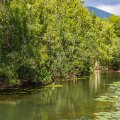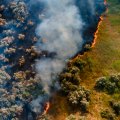A new project by the Queensland Geothermal Energy Centre of Excellence (QGECE) at The University of Queensland is aiming to identify new resources for enhanced geothermal systems.
UQ researchers are preparing for a significant increase in geothermal exploration activities, also known as hot rock geothermal, following the Geothermal Energy Bill which was tabled in the Queensland Parliament on 19 May.
QGECE’s Dr Tonguç Uysal said the pioneering study would attempt to identify Queensland’s hot rock geothermal resources without having to drill deep exploration holes.
“The analysis of near-surface mineral alterations and geochemistry is a well-established method in mineral exploration but it has not been used yet in exploring hot rock geothermal resources,” Dr Uysal said.
“We are one of the few groups in the world working in this area and, in this project, we would like to apply it here in Queensland so that we can better understand and identify Queensland’s hot rock geothermal resources.
“The existence of such knowledge would substantially increase the chances of success in future geothermal projects and would increase the commercial viability of geothermal electricity.”
QGECE PhD student Alex Middleton is investigating the alteration mineralogy of sedimentary rock samples containing the trace element and isotopic signatures of deep high heat-producing granites.
Mr Middleton has said he was planning to analyse samples from the Galilee Basin, Innot Hot Springs region, Hodgkinson Province, Styx Basin, Maryborough Basin and North d’Aguillar Block, Wandilla Province.
“The granites in these areas were generated between the Late Devonian to Triassic representing a geologic time span from 370 to 230 million years ago,” Mr Middleton said.
“Our preliminary research indicates significant promise of hot rock geothermal energy in these areas and my project may provide more evidence for this.”
The Galilee Basin is of special interest to the researchers as it directly overlies the Drummond Basin, which is known to harbour Devonian-Carboniferous granitic igneous rocks abundant in uranium and thorium, providing a significant potential for hot rock geothermal systems. Similar expectations apply to the other target areas.
The Queensland Geothermal Energy Centre of Excellence was established last year at The University of Queensland by a $15 million grant from the Queensland State Government. The QGECE is funded by the Renewable Energy Fund and the Climate Change Fund established as part of Queensland's ClimateSmart 2050 climate change strategy.
The Queensland Government expects 250 MWe to be generated from geothermal energy in Queensland by 2020.
Media: Alexander Middleton from the Queensland Geothermal Energy Centre of Excellence alexander.middleton@uqconnect.edu.au or 0422 708 045; Abby Campbell from the Faculty of Engineering, Architecture and Information Technology abby@uq.edu.au or 07 3346 7696.
.jpg)












